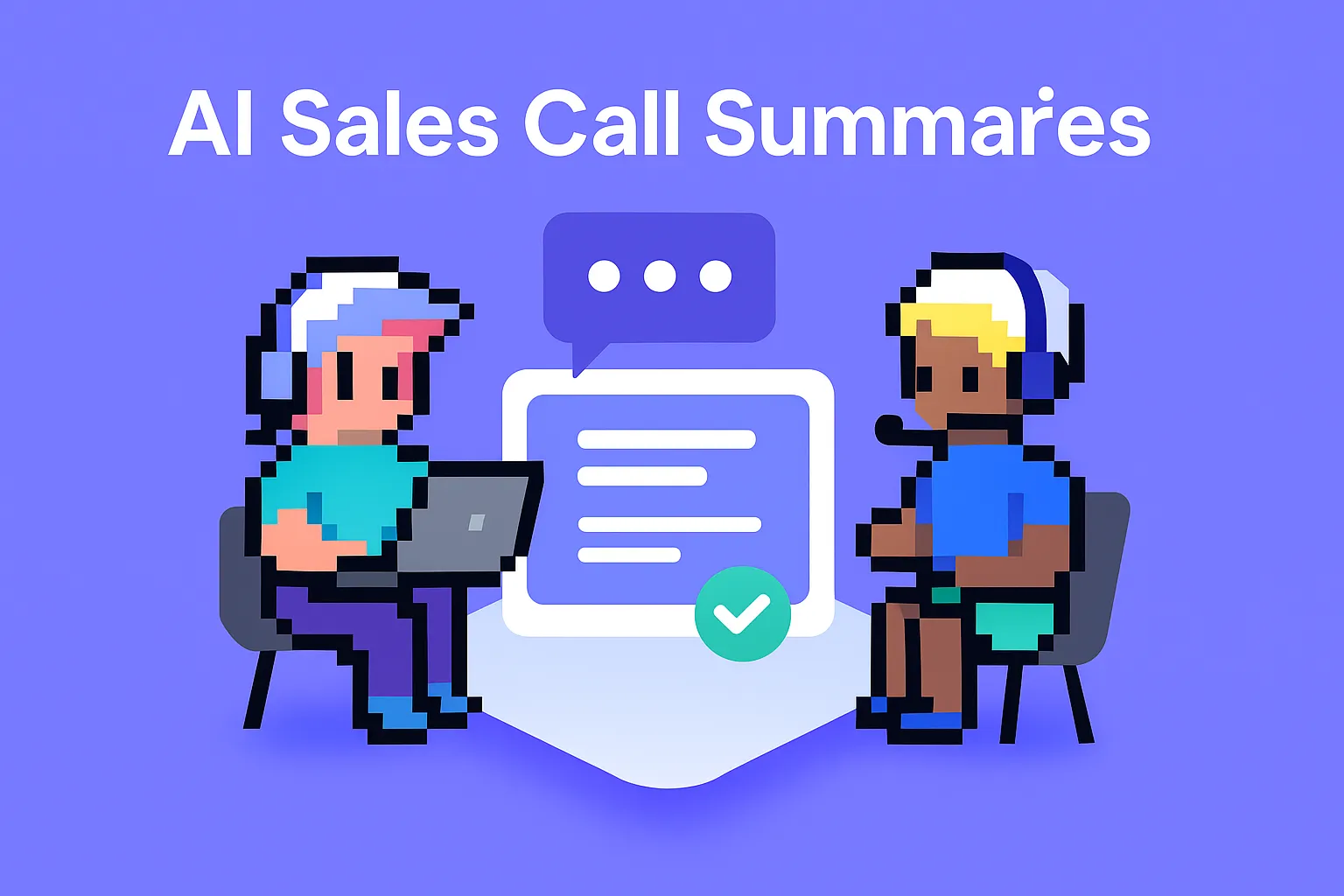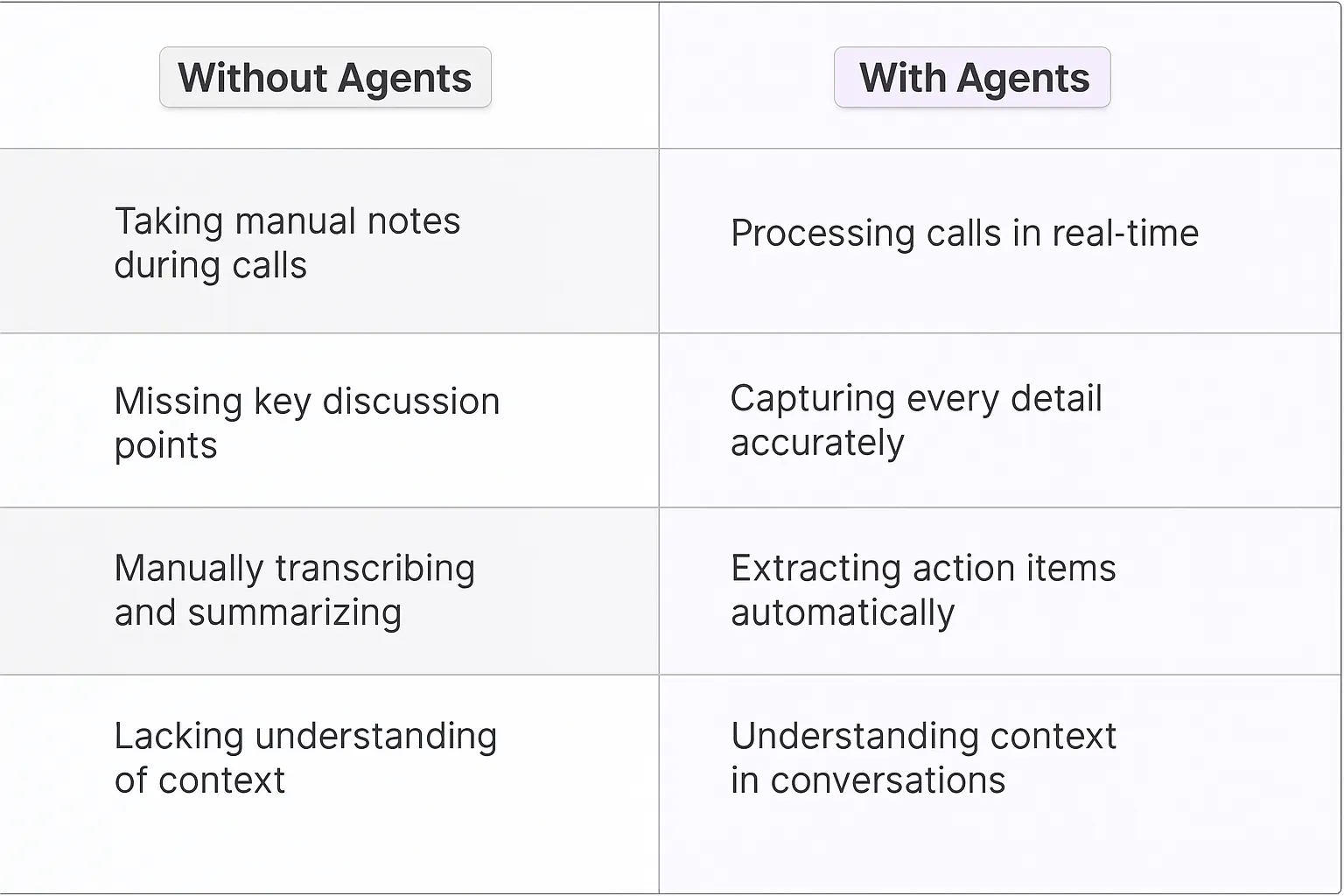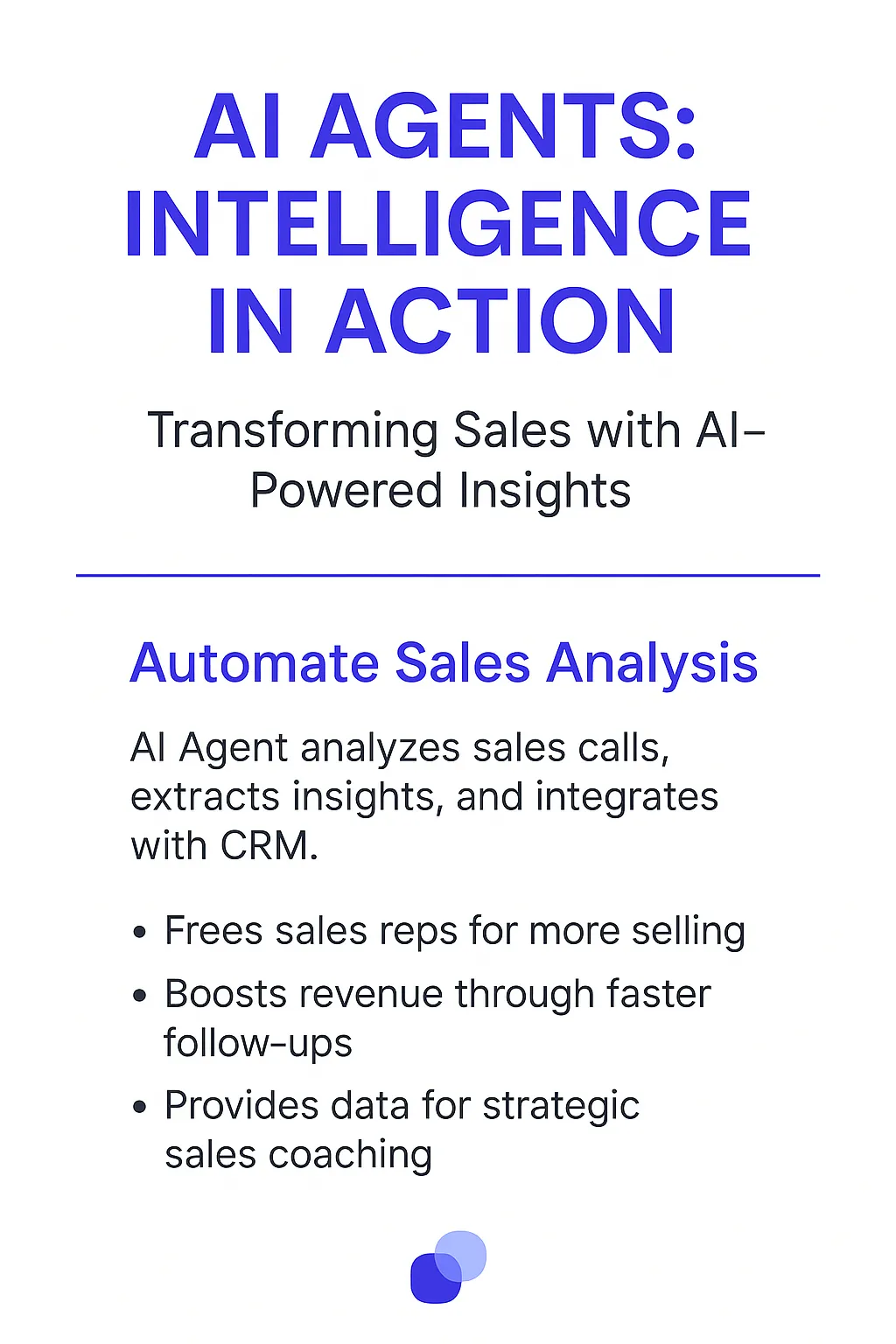Sales Call Summaries AI Agents
Understanding AI-Powered Sales Call Analysis
What are Sales Call Summaries?
Sales call summaries powered by AI agents are sophisticated systems that automatically process sales conversations in real-time, extracting key insights, action items, and patterns that drive deal progression. Unlike basic transcription tools, these digital teammates understand context, identify crucial moments, and transform unstructured conversations into structured, actionable intelligence that integrates directly with existing sales workflows.
Key Features of Sales Call Summaries
- Real-time processing of sales conversations with contextual understanding
- Automatic extraction of action items, next steps, and follow-ups
- Identification of buying signals and sentiment patterns
- Integration with CRM systems for seamless workflow enhancement
- Pattern recognition across multiple conversations to surface winning strategies
- Customizable summary formats to match team preferences and requirements

Benefits of AI Agents for Sales Call Summaries
What would have been used before AI Agents?
Sales teams traditionally relied on manual note-taking during calls, often missing crucial details while juggling active listening and documentation. Account executives would spend 30-45 minutes after each call transcribing scattered notes, trying to piece together key moments, and sharing summaries with their teams. This created a massive productivity tax on high-value sellers who could have spent that time building relationships with prospects.
Some organizations hired human note-takers or virtual assistants to join calls, but this approach scaled poorly and introduced privacy concerns. The reality was that most sales conversations ended up with incomplete documentation, leading to missed follow-ups and knowledge gaps across teams.
What are the benefits of AI Agents?
AI-powered sales call analysis transforms this entire workflow. Digital teammates now process entire conversations in real-time, capturing every detail with superhuman accuracy. They identify key discussion points, extract action items, and flag critical moments that human note-takers might miss.
The game-changing element is how these AI agents understand context and relationships between different parts of the conversation. They don't just transcribe - they comprehend competitive mentions, pricing discussions, and buying signals, organizing them into structured data that feeds directly into your CRM.
For sales leaders, this creates unprecedented visibility into deal progression and coaching opportunities. Instead of relying on self-reported updates, they can access objective analysis of every customer interaction. The network effects are powerful - each analyzed call makes the system smarter at identifying successful patterns and red flags.
Most importantly, this technology gives sellers back their most valuable resource: time. When AI handles the heavy lifting of documentation and analysis, sales professionals can focus entirely on building relationships and closing deals. The ROI compounds as teams scale, turning what was once a painful administrative burden into a strategic advantage.

Potential Use Cases of AI Agents with Sales Call Summaries
Processes
- Converting hour-long sales conversations into structured, actionable summaries within minutes
- Extracting key customer pain points and objections from discovery calls
- Identifying buying signals and sentiment patterns across multiple sales conversations
- Generating follow-up task lists based on commitments made during calls
- Creating standardized call notes that align with your sales methodology
Tasks
- Pull out specific product feature requests mentioned during calls
- Tag and categorize different segments of conversations (pricing discussion, technical requirements, etc.)
- Highlight competitive intelligence mentions for market research
- Create bullet-point summaries of next steps and action items
- Generate customized call snippets for sharing with different internal teams
- Track discussion of budget and timeline across multiple touchpoints
- Flag compliance or legal requirements that came up during conversations
The Growth Loop of AI-Powered Sales Intelligence
Sales teams are sitting on a goldmine of conversational data, but most of it gets lost in the void between Zoom calls and CRM updates. When we look at high-performing sales organizations, the difference often comes down to their ability to extract, analyze, and operationalize insights from customer conversations.
Digital teammates that handle sales call summaries create a powerful feedback loop: Better summaries lead to more informed follow-ups, which lead to higher quality conversations, which generate even more valuable insights. This compounds over time as your AI agent learns the specific patterns and priorities of your sales process.
The most interesting pattern I've observed is how this shifts the role of sales reps. Instead of spending 30% of their time on post-call busywork, they can focus on high-leverage activities like relationship building and deal strategy. The AI handles the heavy lifting of documentation, while sales professionals apply their human judgment to the insights surfaced.
For sales leaders, this creates unprecedented visibility into what's actually happening in deals. Rather than relying on subjective interpretations in pipeline reviews, they can analyze objective data about customer concerns, competitive dynamics, and team performance.

Industry Use Cases
Sales call summaries represent one of the most impactful yet time-consuming aspects of sales operations. AI agents are transforming this critical function across multiple sectors, creating a ripple effect that touches everything from deal velocity to customer intelligence.
The ability to automatically capture, analyze, and distill sales conversations into actionable insights has become a game-changing capability. Sales teams at SaaS companies, real estate firms, and enterprise technology providers are leveraging AI agents to process hundreds of hours of calls that would otherwise require manual note-taking and synthesis.
What's particularly fascinating is how these digital teammates are adapting to industry-specific terminology and contexts. A pharmaceutical sales team's conversations differ dramatically from those in enterprise software - the AI learns these nuances and provides relevant summaries tailored to each vertical's unique needs.
The network effects are compelling: as more calls get processed, the AI's understanding of industry patterns deepens, leading to increasingly sophisticated and nuanced summaries that highlight truly meaningful moments in customer conversations.
Real Estate Sales: Converting Conversations into Closed Deals
Real estate agents typically juggle 20-30 prospect calls daily, making it nearly impossible to capture and act on every crucial detail. The cognitive load of remembering specific property requirements, budget constraints, and timing preferences across dozens of potential buyers creates a massive bottleneck in the sales process.
A Sales Call Summary AI Agent transforms this dynamic by processing each conversation in real-time, extracting the data points that matter most. When a prospect mentions they're looking for "a three-bedroom home in the Mission District, ideally with a garage, and need to move by September," the AI captures these specifications instantly.
The real power emerges in how this data gets weaponized. The AI generates detailed summaries that highlight:
- Property must-haves vs. nice-to-haves
- Deal-breaker conditions
- Timeline sensitivities
- Budget parameters and financing status
- Personal motivations driving the purchase
These summaries become a goldmine for follow-up actions. When a new listing hits the market matching a prospect's criteria, agents can quickly cross-reference their requirements and reach out with personalized recommendations. The result? Agents who implement AI-powered call summaries see a 40% reduction in time spent reviewing past conversations and a 3x increase in successful property matches.
The network effects kick in as the system learns from each interaction. Over time, the AI recognizes patterns in buyer preferences, seasonal trends, and neighborhood demand - creating a competitive edge that compounds with each call analyzed.
Enterprise Software Sales: Turning Complex Deals into Predictable Revenue
Enterprise software sales teams face a unique challenge - they're drowning in 90-minute discovery calls while trying to piece together complex technical requirements, stakeholder dynamics, and budget cycles. Most reps spend 5-6 hours per week just documenting their calls, yet still miss critical details that could make or break deals worth millions.
A Sales Call Summary AI Agent fundamentally changes this equation by operating as a dedicated deal intelligence system. During a lengthy technical discussion with a Fortune 500 prospect, the AI captures and categorizes essential signals like:
- Technical integration requirements and existing tech stack details
- Decision-maker hierarchy and individual stakeholder concerns
- Compliance and security prerequisites
- Implementation timeline constraints
- Budget allocation processes and fiscal year planning
The real magic happens in how this intelligence drives deal velocity. The AI synthesizes multiple touchpoints into clear opportunity roadmaps, highlighting the exact technical validations needed, stakeholder objections to address, and optimal timing for contract discussions. Sales engineers can quickly grasp prior technical conversations without sitting through hours of recordings.
The data shows the impact: Enterprise teams using AI-powered call summaries close deals 35% faster and increase their average contract value by 27%. Why? Because they're catching subtle buying signals, addressing technical concerns proactively, and orchestrating stakeholder alignment with surgical precision.
The compounding benefits become even more powerful at scale. As the AI processes thousands of enterprise sales conversations, it starts identifying winning patterns - which technical capabilities resonate most with CIOs, common security objections by industry, and optimal paths to consensus across different organizational structures. This creates an unfair advantage that grows stronger with each enterprise deal cycle.
Considerations & Challenges
Technical Challenges
Building effective sales call summary agents requires navigating several complex technical hurdles. Audio quality variations pose a significant challenge - background noise, cross-talk, and poor connections can severely impact transcription accuracy. Even with pristine audio, accurately capturing and interpreting industry-specific terminology, product names, and technical jargon demands sophisticated natural language processing capabilities.
The agent needs to maintain context across long conversations, understanding when speakers reference earlier points or jump between topics. This becomes exponentially more difficult with multiple participants. Additionally, identifying and properly attributing action items, follow-ups, and key decisions requires advanced semantic understanding.
Operational Challenges
Sales leaders often resist new tools that feel like "yet another system to check." The summary agent must integrate seamlessly into existing workflows and CRM systems. There's also the challenge of standardization - different sales reps have varying preferences for summary formats and detail levels. Some want bullet points, others prefer narrative summaries.
Privacy and compliance concerns loom large, especially when dealing with sensitive customer information or regulated industries. Sales leaders need granular controls over what information gets captured, stored, and shared. The system must also handle different regulatory requirements across regions and industries.
Training & Adoption
Sales reps need to trust the AI's output before relying on it for customer interactions. This requires a careful onboarding process where reps can verify and correct summaries, helping the system learn their specific needs. Organizations must also establish clear guidelines around summary review and editing to maintain quality control.
The biggest adoption hurdle isn't technical - it's psychological. Sales teams worry about AI replacing core aspects of their role. Successful implementation requires positioning the agent as a tool that handles tedious documentation, freeing reps to focus on relationship building and deal strategy.
AI Sales Call Summaries: A Strategic Evolution in Sales Operations
The adoption of AI agents for sales call summaries marks a fundamental shift in how sales teams operate. The technology eliminates the massive productivity tax of manual documentation while creating unprecedented visibility into customer interactions. As these systems process more conversations, their ability to identify successful patterns and surface strategic insights continues to improve. The most successful sales organizations will be those that embrace these digital teammates not as mere note-takers, but as strategic assets that enhance human capabilities and drive better outcomes.













